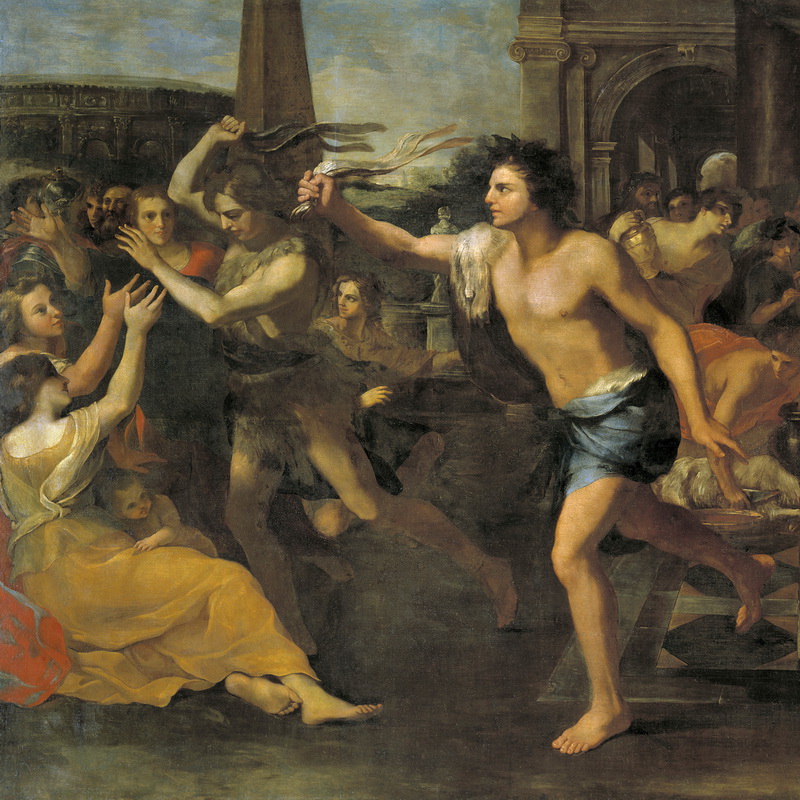Happy Valentine, or… Felix Lupercalia?

Ah, Valentine’s Day—the day of love, flowers, and overpriced chocolates. A day when the world transforms into a pink-and-red frenzy, couples post overly enthusiastic declarations of love, and singles either celebrate freedom or drown their sorrows in wine and Netflix. But what if I told you that this saccharine-sweet celebration has its origins in one of the wildest, most uninhibited pagan festivals of ancient Rome?
Let’s take a step back in time, to the Lupercalia, a festival that was anything but romantic in the way we understand romance today. If anything, it was a mix of fertility rite, purification ritual, and a full-on bacchanalian revelry where half-naked men ran around the city whipping women with strips of freshly sacrificed goatskin.
Yes, you read that correctly.
From Wolves to Love Stories
Lupercalia was celebrated every February 15th in honor of Lupercus, a god linked to fertility, wild nature, and (possibly) protection against wolves. It was also associated with the legendary she-wolf that nursed Rome’s founders, Romulus and Remus. The festival was a mix of archaic religious fervor and good old-fashioned debauchery.
Here’s how it went: the ceremony began in a cave—Lupercal—at the base of the Palatine Hill, where priests called Luperci sacrificed goats and a dog (symbolizing virility and purification, respectively). Then, in a scene straight out of an R-rated historical drama, the young men smeared themselves with the blood of the sacrifices, dressed in goat skins (or in some cases, didn’t dress at all), and ran wildly through the streets, striking women with strips of goat hide.
And the women? Far from running away screaming, they lined up to be whipped! The belief was that the touch of these sacred thongs (known as februa, from which the month “February” derives) would enhance fertility and ease childbirth. Clearly, ancient Rome had its own version of matchmaking.
The Church: “Enough with the Scandal!”
Now, imagine the reaction of the early Christian Church when faced with this spectacle. The Lupercalia was everything that Christianity sought to suppress: pagan, chaotic, and brimming with earthy, physical expressions of life and love. It was only a matter of time before the Church declared war on it.
Enter Pope Gelasius I, who, in the late 5th century AD, decided that enough was enough. He denounced the festival as un-Christian and replaced it with a more “civilized” celebration—one that honored Saint Valentine, a bishop who (supposedly) performed secret marriages for Christian couples during Roman persecutions. The Lupercalia was formally banned, and February 14th was declared a day of love—not the untamed, carnal kind of the old festival, but the more spiritual, poetic, and sentimental version we know today.
However, despite the Church’s efforts, echoes of Lupercalia persisted. The idea of love in February never quite faded, and over time, medieval poets, particularly Geoffrey Chaucer, helped shape Valentine’s Day into the courtly, romantic celebration that slowly evolved into today’s commercialized spectacle.
Lupercalia, Valentine’s Day, and the Echoes of the Pagan World
The story of Valentine’s Day is not unique. So many of our holidays—Christmas, Easter, Halloween—have roots deep in the ancient Mediterranean world. They were once pagan festivals that marked the rhythms of nature, fertility, harvests, and the divine cycles of life and death.
Lupercalia, in particular, is a reminder that love—whether expressed through poetry, candlelit dinners, or half-naked men running through the streets with goat skins—has always been a central human concern. The Church tried to refine it, society tried to package it, and Hallmark turned it into a billion-dollar industry. But at its core, the idea remains the same: love, in all its forms, deserves to be celebrated.
So, whether you’re exchanging roses and chocolates, avoiding the holiday altogether, or secretly considering reviving the goat-skin-whipping tradition (please don’t), just remember: today’s Valentine’s Day is just a more socially acceptable version of one of the wildest festivals in history.
Felix Lupercalia, everyone!


